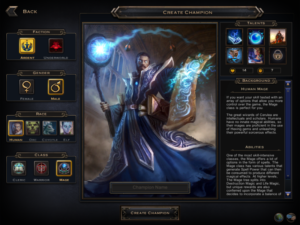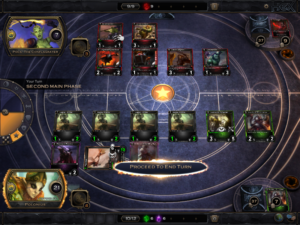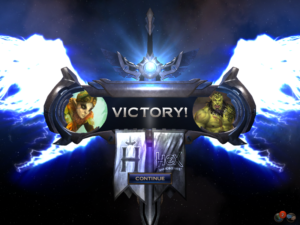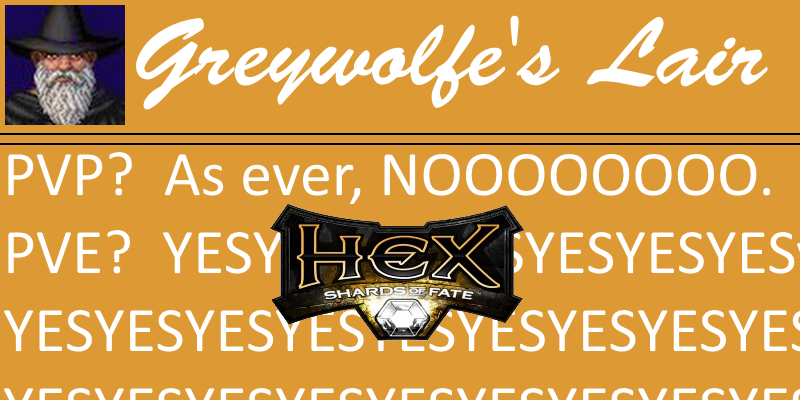The Hex Player Versus Environment game is awesome and I wish more card games would do it. There. Review done.

But seriously.
Hex has had a troubled past. It has a pretty troubling future, too. But at least some of it's future is now with us in the form of the Player Versus Environment game that they had promised since way back when in 2013, when they launched their Kickstarter.
And this, friends, is why Kickstarter isn't always a great idea.
While, on the one hand, it's great that Kickstarter gave us this game, on the other, it's a good look at how promises can be made...and made...and made and you might get the advertised game. Someday.
Anyhow, the main point is that Hex has a number of features that are slowly being delivered and - for the longest time, it looked like they probably weren't going to deliver them. PVP was with us during the beta and used to be the only way you could get coin. Then, in 2015, the Frost Ring Arena arrived and gave us our first real [rather grindy] taste of what the PVE might feel like, but then, in January of 2016, we got the first real concrete part of what might be the long-term future for Hex in the form of an Adventure Zone.
Up until the Adventure Zone, Hex was pretty much like the current crop of CCG's. You get some cards, you make a deck and you do Player versus Player activities until your eyes bleed. And, quite frankly, I'm not a fan of playing against other players. Spellweaver proved that when the game is a CCG and your playerbase are "top heavy" [that is, they have all the cards already in the game] your PVP had better be up to snuff. And as with most of these games, the PVP generally isn't. Hearthstone managed to get this right by realizing that you need a proper matchmaking system. This would probably help all these other games, but the population count for all of them is too low. And in Hex's case, that's kind of a shame.
Hex is one thing several of these other card games are not, you see. Where there's an interesting wrinkle or two with Spellweaver, it's done an odd thing with it's mana system that makes it difficult to play more than three colours. And while Hearthstone might force you [a lot] to think about combat math, it is woefully simple otherwise. You take a turn, they take a turn and nothing else gets in the way.

Hex, on the other hand, wants the complexity a digital card game can bring to the table. It courts it with it's heart and soul. Arms wide open. "Here," it's saying, "is a medium where we can do weird stuff. Why aren't we?" And it's great. You can - at long last in a digital game that's not Magic - actually do things during your opponent's turn. Sure. This does mean it's not exactly new-player-friendly - and the campaign certainly doesn't shy away from beating seven shades out of a new player because they're not thinking tactically, but I adore this and wish more card games would embrace it.
Part of the problem with the complexity is that it can send a new player into a tail spin of losing, simply because there are so many options. "How do I block all these creatures? Hearthstone just allowed me to attack anyone at any time!" Or if you're from Spellweaver: "It's so hard to pare down my deck to just sixty cards! I can play all sorts of colours!"
So, one thing Hex has got to do more of is slowly nuance the complexity so that new players don't get completely overwhelmed. The tutorial isn't great at this. It just presents the game as a giant, one-hour-long info-dump. No new player is going to manage all of this fresh knowledge.
What should happen is that the game should dole this out a little more slowly - putting it into a mini-campaign of it's own that introduces creatures - allows you to play with some creatures and then builds upon that base to get the new player both cards and comfort.
And this, perhaps, is Hex's greatest sin. Of all the card games I've played up until now [I'm looking for a Hearthstone replacement, because Blizzard seems to have skidded right off the rails and are crashing into building after building as they ski down the slope.] Hex has the poorest free to play model I've encountered.
Packs can be gotten with the real money currency. If you buy those packs that way, you also get a 2% chance to get a "primal pack" which grants you many more rares and the like. You can buy packs on the auction house for gold - which the game doles out through the quests built into the campaign, but the amounts are meager and the cost-per-pack is absurd. And this is going to send new players running for the hills. Adventure Zones do help a little - at the end of most major encounters, you get a couple of cards that you can use to spruce up your deck, but that wonderful complexity means that it's very difficult to know what to add and what to remove to make your deck more efficient.
There's also a curious omission here that I find a bit awkward. All of these other games draw you back with a daily system of some persuasion. Hex does not do that. You will have to play it much like you played an old-school game - if you feel like hopping in, do so. If you don't, you don't lose anything in particular.

So, while I love the PVE and adore the complexity of Hex, I'm going to have to say that this one is for the very patient. You can accrue cards if you spend your gold wisely, but you will have to - unlike most CCG's do a lot of research.
I did a "beginner's guide to Hex" and you can watch it here.


“The Hex Player Versus Environment game is awesome and I wish more card games would do it.”
This is why I’m both really excited to see Gwents campaign and maybe even ESLegends.
Having the pve option I’m Hearth stone was a God send. And their adventures had the most heart out of anything else I’m the game
it’s just a pity that those adventures are so short. i feel like there’s a goldmine of interesting things that blizzard could do with it, but they’re very focused on the pvp.